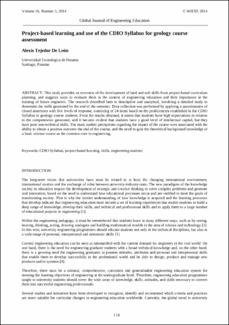El sistema se apagará debido a tareas habituales de mantenimiento. Por favor, guarde su trabajo y desconéctese.
Project-based learning and use of the CDIO Syllabus for geology course assessment
| dc.contributor.author | Tejedor De León, Alexis | |
| dc.date.accessioned | 2018-04-06T19:57:35Z | |
| dc.date.accessioned | 2018-04-06T19:57:35Z | |
| dc.date.available | 2018-04-06T19:57:35Z | |
| dc.date.available | 2018-04-06T19:57:35Z | |
| dc.date.issued | 2014-07-06 | |
| dc.date.issued | 2014-07-06 | |
| dc.identifier.uri | http://ridda2.utp.ac.pa/handle/123456789/4463 | |
| dc.identifier.uri | http://ridda2.utp.ac.pa/handle/123456789/4463 | |
| dc.description | This study provides an overview of the development of hard and soft skills from project-based curriculum planning, and suggests ways to evaluate them in the context of engineering education and their importance in the training of future engineers. The research described here is descriptive and analytical, involving a detailed study to determine the skills generated by the end of the semester. Data collection was performed by applying a questionnaire of closed assertions with five levels of response, consisting of 24 items based on the proficiencies established in the CDIO Syllabus to geology course students. From the results obtained, it seems that students have high expectations in relation to the competencies generated, and it became evident that students have a good level of intellectual capital, but they have poor non-technical skills. The main student perceptions regarding the impact of the course were associated with the ability to obtain a positive outcome the end of the course, and the need to gain the theoretical background knowledge of a basic science course as the common core in engineering. | en_US |
| dc.description.abstract | This study provides an overview of the development of hard and soft skills from project-based curriculum planning, and suggests ways to evaluate them in the context of engineering education and their importance in the training of future engineers. The research described here is descriptive and analytical, involving a detailed study to determine the skills generated by the end of the semester. Data collection was performed by applying a questionnaire of closed assertions with five levels of response, consisting of 24 items based on the proficiencies established in the CDIO Syllabus to geology course students. From the results obtained, it seems that students have high expectations in relation to the competencies generated, and it became evident that students have a good level of intellectual capital, but they have poor non-technical skills. The main student perceptions regarding the impact of the course were associated with the ability to obtain a positive outcome the end of the course, and the need to gain the theoretical background knowledge of a basic science course as the common core in engineering. | en_US |
| dc.language | eng | |
| dc.language.iso | eng | en_US |
| dc.rights | https://creativecommons.org/licenses/by-nc-sa/4.0/ | |
| dc.rights | info:eu-repo/semantics/openAccess | |
| dc.subject | CDIO Syllabus | en_US |
| dc.subject | project-based learning | en_US |
| dc.subject | skills | en_US |
| dc.subject | engineering students | en_US |
| dc.subject | CDIO Syllabus | |
| dc.subject | project-based learning | |
| dc.subject | skills | |
| dc.subject | engineering students | |
| dc.title | Project-based learning and use of the CDIO Syllabus for geology course assessment | en_US |
| dc.type | info:eu-repo/semantics/article | |
| dc.type | info:eu-repo/semantics/publishedVersion |
